‘A Prairie lawyer who had good luck’: Senator Doug Black retires
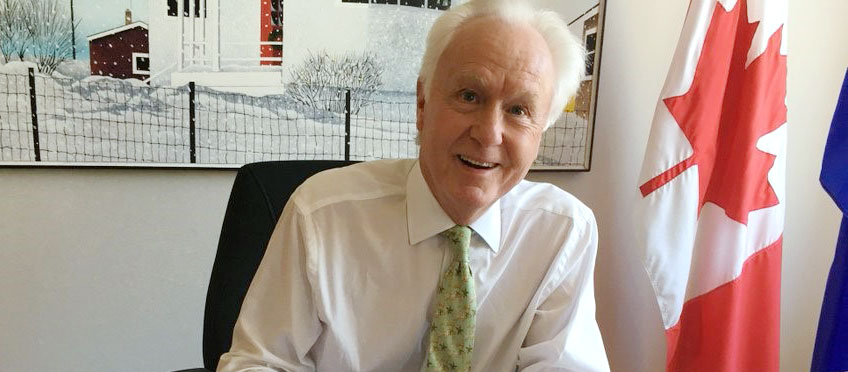
Inspired by the community involvement of his parents, Senator Doug Black left a career in corporate law and decided to throw his hat into the ring to become a senator representing Alberta — a province that sometimes holds Senate nominee elections. Whether in the Chamber, in committee or on the road, Senator Black says representing Albertans has been the highlight of his professional life.
Upon his retirement in October 2021, SenCAplus asked Senator Black to reflect on his time in the Upper Chamber.
Before you were a senator, you worked as a corporate lawyer. How did this prepare you for your work in the Senate?
To be successful as a lawyer, you have to be able to digest vast amounts of material quickly and to synthesize, which trains you for the Senate because there are volumes of material that come at you on any file, on any day. Likewise, you must be a good listener. You have to watch and listen carefully, because there are always other points of view and it’s always helpful to understand as many points of view on an issue as you possibly can.
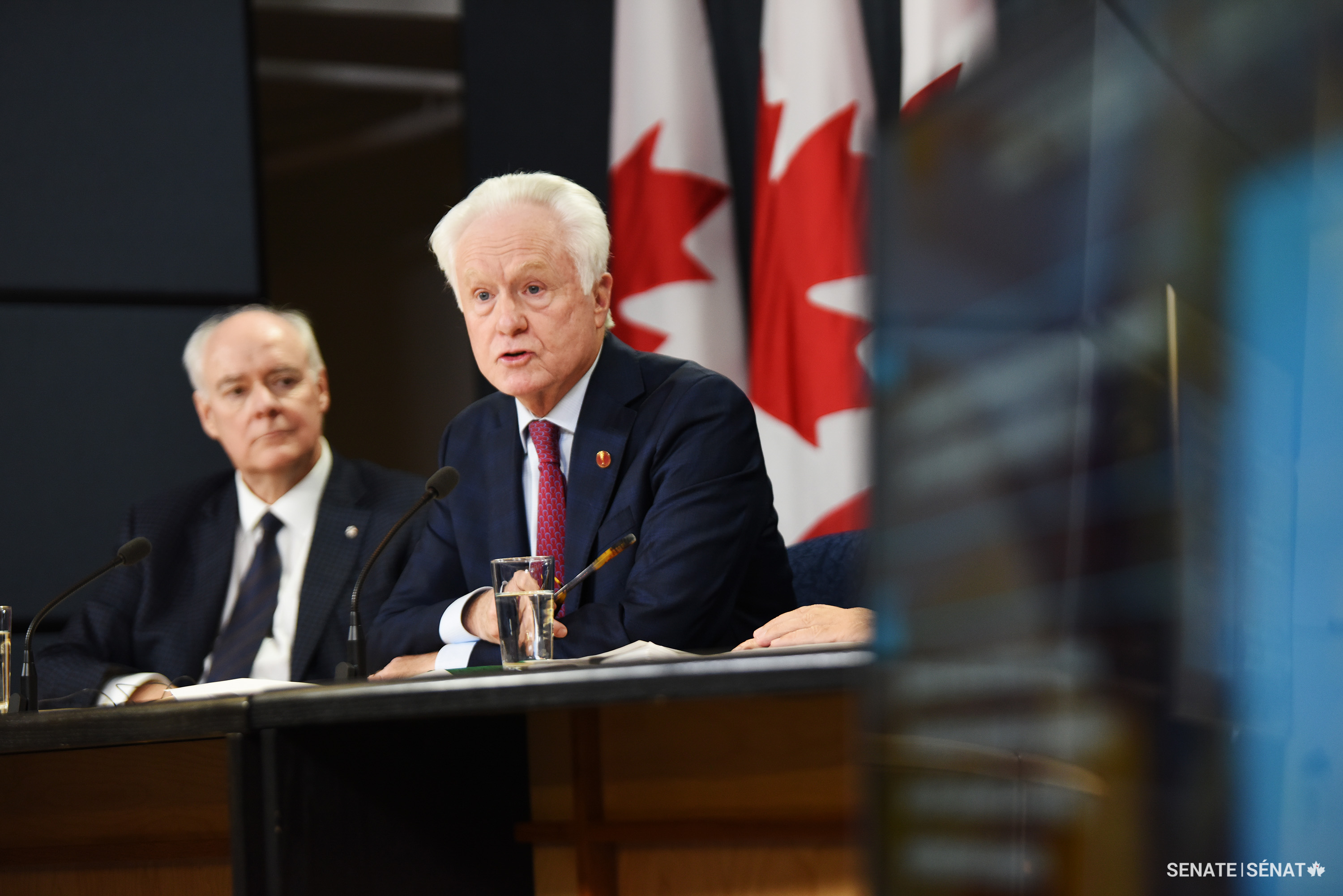
Senator Doug Black takes questions during a press conference on Canada: Still Open for Business? — a report done by the Senate Committee on Banking, Trade and Commerce in 2018.
You represent Alberta, a province that holds Senate nominee elections. These elections are not binding on the prime minister, but in the past some nominees have received Senate appointments, including yourself. Why were you interested in putting your name forward to be a senator?
I did it because I believe in public service, and I love public policy. And I like people. Politics is people, full stop. I love meeting with people, learning from people, feeling that I’m helping people. And I love Alberta.
When this opportunity arose, senators-in-waiting were elected in Alberta and you had a pretty good understanding that if you won, you’d be appointed because you had a prime minister at the time who was committed to that process. The stakes were high: on the final ballot there were 13 credible candidates.
Your connection to your province of Alberta runs deep. How did that shape your work at the Senate?
I’m looking at one of my campaign posters and it says, “Alberta’s Voice. Now.” I was of the view that Alberta would benefit from enhanced representation on issues that matter to Alberta and to Canada.
Because of my corporate and public service experience, I felt I had something to contribute — on energy, on post-secondary, on the arts — and the credibility to express those points of view. I’m also of the view that Alberta doesn’t tell its story particularly well. I thought I could be helpful in presenting a face to Canada of an Alberta that is rational, considered, and full of great Canadians.
My game was representing Albertans here in Ottawa and I tried to do the very best I can every day. Over my time, I visited approximately 50 communities in Alberta, met tens of thousands of people. I’ve made it my business to be deeply connected to every corner of the province.
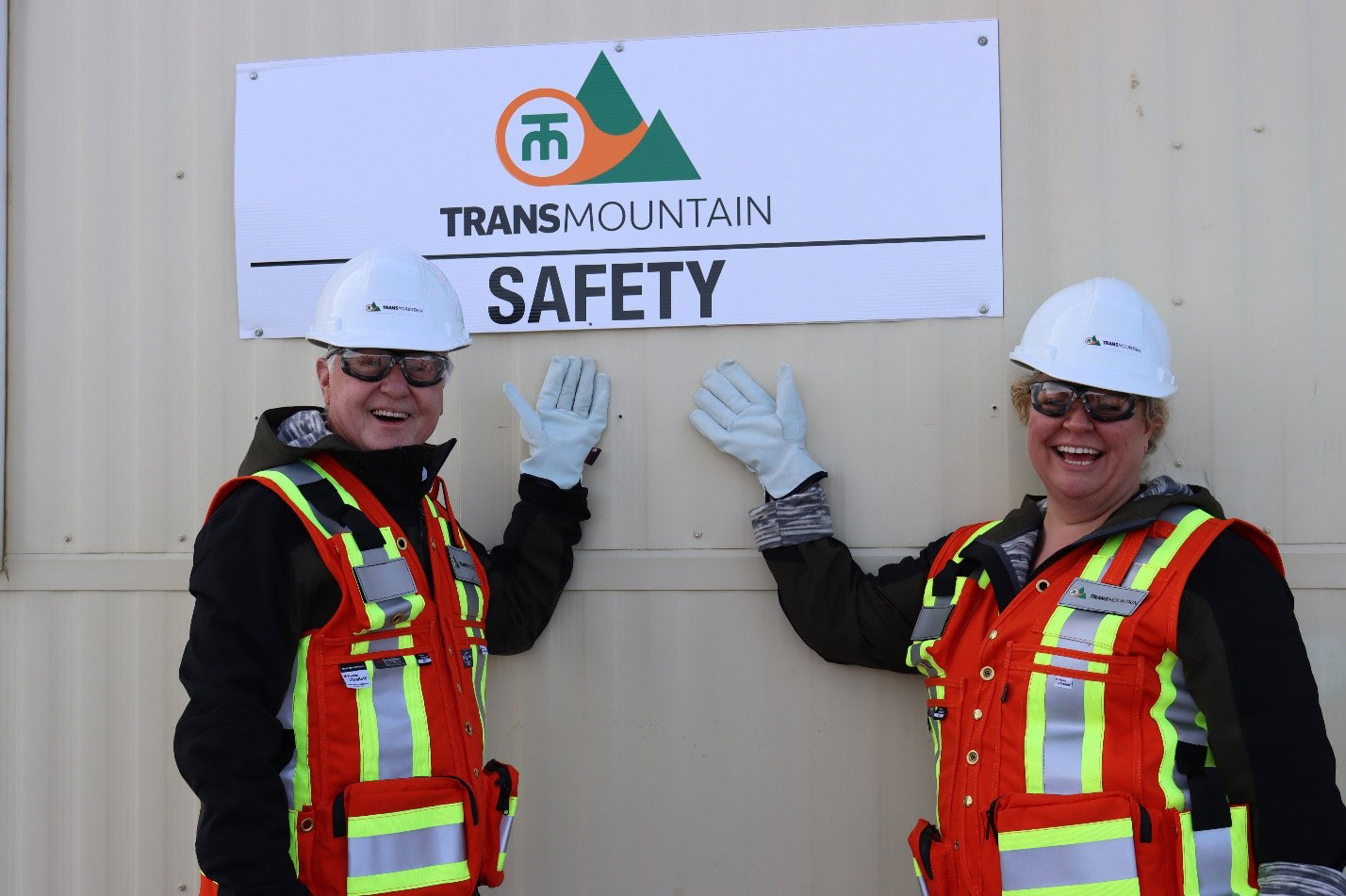
Senator Doug Black, left, tours a Trans Mountain construction site near Edmonton, Alberta in February 2020.
Did anything surprise you about the Senate?
Was there anything that didn’t surprise me?
I came from a business environment where the emphasis was getting a result, not on the process. Suddenly, I’m in a place where process really matters, and results — if you get them — are perhaps less frequent. Where I came from, you express your point of view and I mine, and we try and make whatever comes to us a little bit better. But that’s not quite how things work.
What did I do about it? Early on, I introduced my seven-point plan for Senate reform. Ten years later, we’ve got broadcasting in the Senate. We’ve got full disclosure of expenses. I strongly believed, because of my business background, that the Senate should have an independent audit committee with independent members — I’m happy to see that that is now done. I continue to believe the Speaker of the Senate should be elected, so that’s unfinished business. It’s a great institution: there’s room for improvement, but you don’t throw out the baby with the bathwater.
During your years at the Senate you worked on many committees, notably the Senate Committee on Energy, the Environment and Natural Resources and the Senate Committee on Banking, Trade and Commerce. What committee work are you most proud of and why?
The greatest strength of the Senate is the committee structure. It has the potential to be one of Canada’s best think tanks because we have great minds, great resources, and the ability to study whatever issue we want to study.
I’ve always felt that we should study “matters that matter.” When I had the privilege of serving on the Senate Committee on Banking, Trade and Commerce, and then as the first Westerner to chair that committee, I felt that there were some areas that we needed to work on. I’m proud of the work we did on Bitcoin and blockchain. We looked at open banking — the concept of consumer-driven banking. Canada is lagging there, and the Senate committee did a tremendous piece of work on that. Interprovincial trade barriers are costing the Canadian economy billions of dollars. This is just dumb: we highlighted that in a strong report. Because of all the difficulties we’ve had in Canada in developing infrastructure, I participated in a study on an infrastructure corridor across Canada. It would provide a dedicated route for infrastructure, which we need, and which we’re having a heck of a time building. All of those studies, if implemented by the government, will enhance Canadian productivity and prosperity.
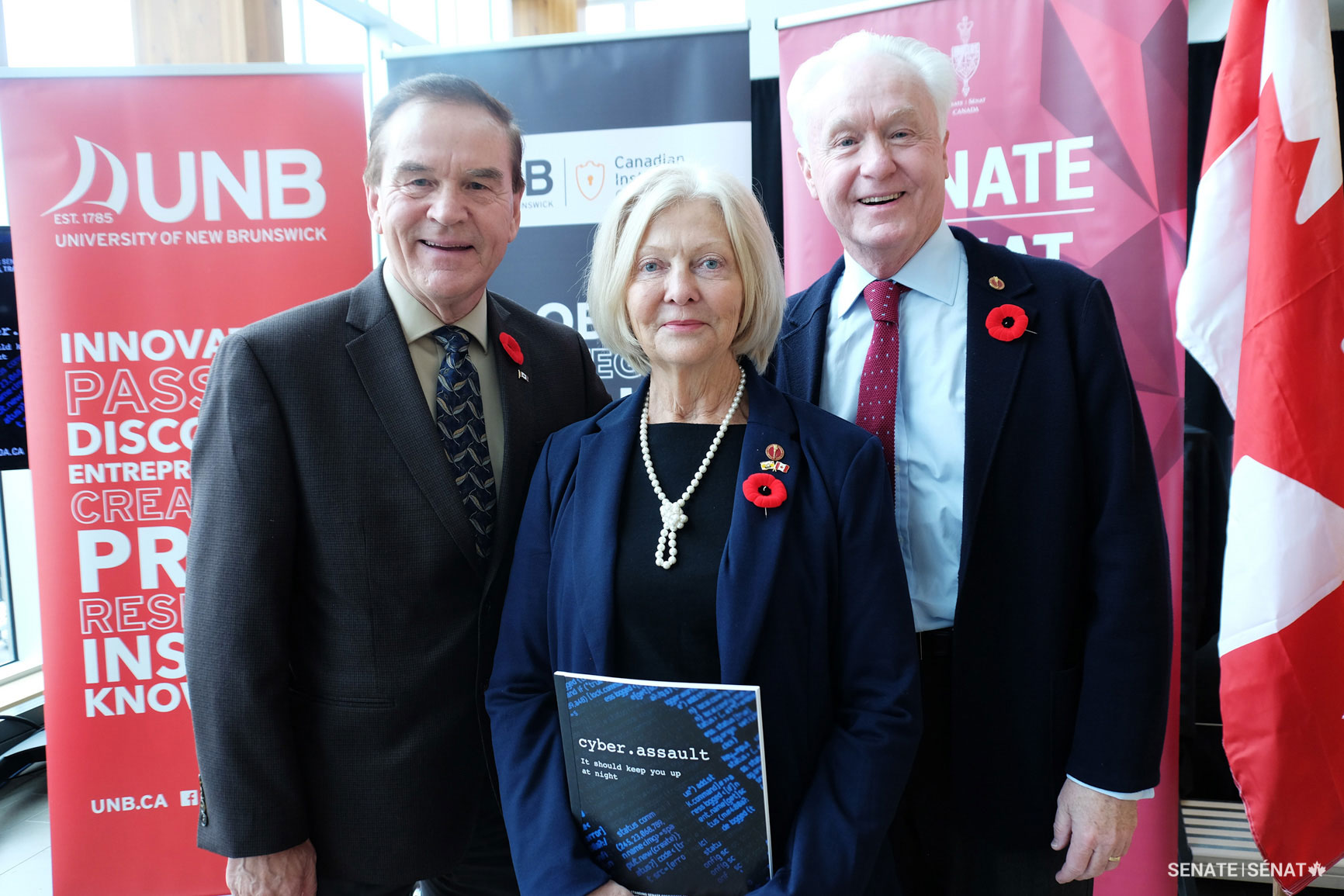 From right, senators Doug Black, Carolyn Stewart Olsen and Percy Mockler present a report on cyber assault done by the Senate Committee on Banking, Trade and Commerce at a 2018 press conference in Fredericton, N.B.
From right, senators Doug Black, Carolyn Stewart Olsen and Percy Mockler present a report on cyber assault done by the Senate Committee on Banking, Trade and Commerce at a 2018 press conference in Fredericton, N.B.
On the energy committee, it was more complicated because the times are tougher vis-à-vis the acceptance of oil and gas in Canada. I represent Alberta, so [oil and gas] is a big file. It’s not only the principal industry of Alberta — the principal export of Canada is oil and gas. I always needed to be mindful that the voice of the responsible energy industry in Canada was reflected and it’s something I did ferociously.
On the legislative front, you were especially active in the Chamber regarding bills that would impact Alberta and the energy sector — which bills stood out for you?
I’m really proud of Bill S-245, the Trans Mountain Pipeline Project Act. It’s key to Alberta and to Canada to get energy to tidewater. Because of the difficulties we’ve had with Keystone, Energy East and Northern Gateway, the last pipeline standing was Trans Mountain, the line that runs from Fort McMurray, Alta. to Burnaby, B.C., which, ultimately, the Government of Canada bought. It was important that we declare that pipeline in the national interest of Canada. And that’s what S-245, which passed the Senate, did. The significance was that the Government of Canada would take full responsibility for building that pipeline. If other interests along the pipeline wanted to interfere, they couldn’t. It was a hammer, but it’s a hammer that the Senate understood was in Canada’s interest.
I am also pleased, not with the result, but with the work that I co-ordinated and led around what’s referred to as Bill C-69, which in my view restricts infrastructure development in Canada, and Bill C-48, which is a piece of legislation that restricts oil tankers taking product off the west coast of Canada. People recognize the role that I took to build coalitions to improve C-69 and to kill C-48. And ultimately, I was unsuccessful on both.
We have seen investment leave Canada under Bill C-69 and the revamp of the National Energy Board. We have seen no major projects built in this country and that isn’t just oil sands: that is harbours, rail lines, airports — anything that needs federal approval. We have to ask if that is in Canada’s interest. I’m hopeful that it will get amended because I think the lack of balance in the legislation will become clear when Canada continues to lose its competitive position globally.
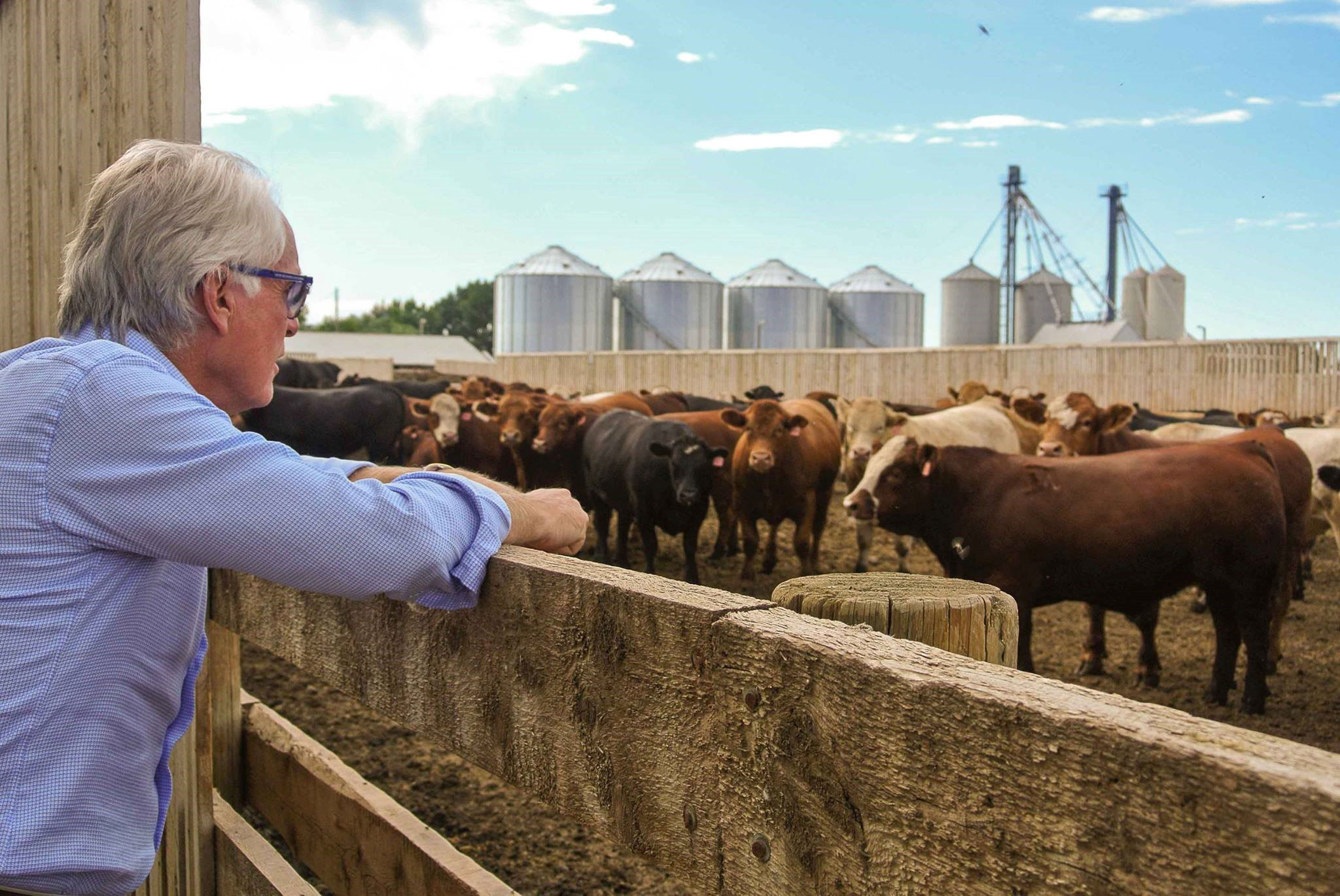
Senator Doug Black visits a cattle operation just southeast of Lethbridge during a tour of southern Alberta.
Those are the pieces of legislation that I think I will be remembered for. Almost every day that I’m out in Alberta, people come up and thank me for that work. I find that reaffirming because I’m not a fighter, but I was put in a position where, to advance the interests as I saw them of Alberta and Canada, I had no choice. You get a job and sometimes the job demands something that perhaps you didn’t expect.
You’ve said you’re retiring from the Senate because it’s someone else’s turn. What advice would you give to an incoming senator, especially one from Alberta?
The Senate is like no other beast in Canada. There is nobody who can tell you that they arrived here and understood it. Sit back — no one’s pushing you out of here — for a period of time and intervene where you feel you must, but watch, learn, listen, not only the process, but the people, politics, media, the interplay of the role.
The second piece of advice is to get to know your constituents. Don’t assume your constituency has an obligation to get to know you. They don’t, and by the way, they won’t because people don’t think that the Senate can assist their interests. The Senate gives you a tremendous platform: use it to understand other people, organizations, communities, what their concerns are, and how you can be of assistance. That’s the greatest part of the job and it allows me to be effective in Ottawa because I know I’m speaking for Alberta.
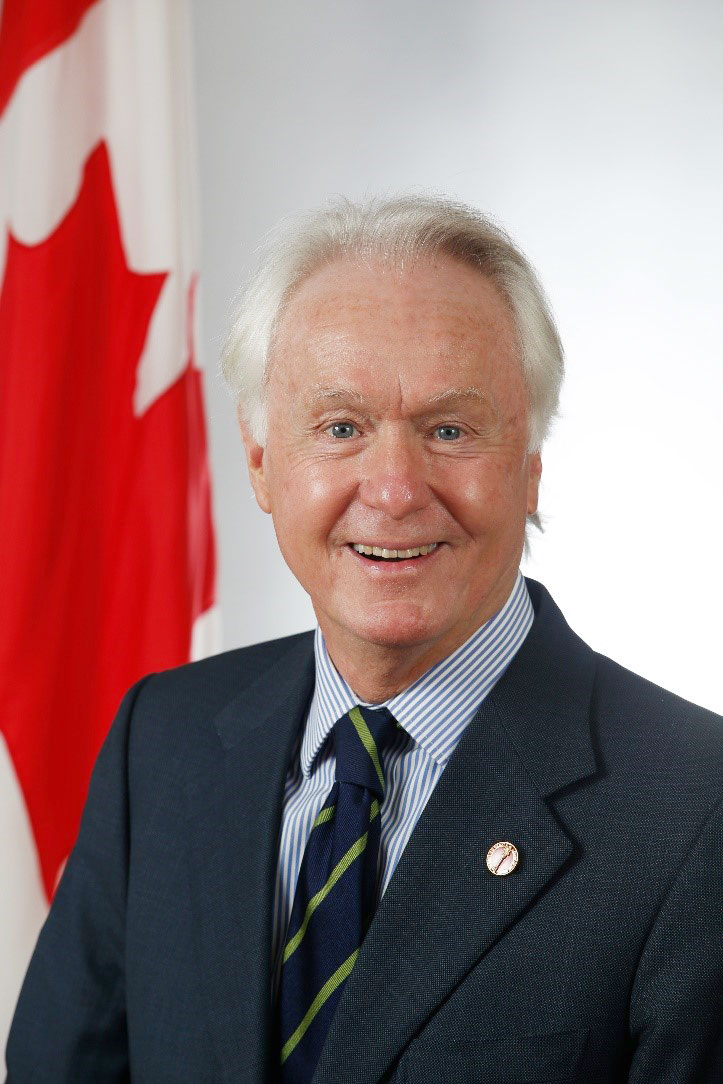
Senator Doug Black’s official Senate photograph.
What will you miss most about the Senate?
I’ll miss the ability to be actively engaged with Albertans where they live; to be able to sit down at Tina’s Café & Bakery in Glenwood, Alta., and ask how the drought is affecting the community. I can’t fix the drought, but I can learn about irrigation and connect people with sources of federal and provincial funds. I can listen and tell them: “You and your community have got the skills to get through this.” Albertans always get through things because we are resilient and compassionate.
What comes next for you?
I’m committed to advancing the interests of Alberta within Canada. Before I came to the Senate, I formed an organization called Alberta 2.0 with a fantastic group of Albertans and some folks outside of the province who are committed to Alberta. We recognized the need to broaden the Alberta economy beyond oil and gas, and we are making great strides. I will continue my involvement in areas that continue to build towards Alberta 2.0.
This has been the complete privilege of my professional life. The opportunity to serve Albertans and Canadians as a senator, let alone as an elected senator, doesn’t happen to many people. I view myself as a Prairie lawyer who had good luck.
The Honourable Doug Black retired from the Senate of Canada in October 2021. Visit the Library of Parliament's Parlinfo website to learn more about his work in Parliament.
Related articles
Tags
Committee news
‘A Prairie lawyer who had good luck’: Senator Doug Black retires

Inspired by the community involvement of his parents, Senator Doug Black left a career in corporate law and decided to throw his hat into the ring to become a senator representing Alberta — a province that sometimes holds Senate nominee elections. Whether in the Chamber, in committee or on the road, Senator Black says representing Albertans has been the highlight of his professional life.
Upon his retirement in October 2021, SenCAplus asked Senator Black to reflect on his time in the Upper Chamber.
Before you were a senator, you worked as a corporate lawyer. How did this prepare you for your work in the Senate?
To be successful as a lawyer, you have to be able to digest vast amounts of material quickly and to synthesize, which trains you for the Senate because there are volumes of material that come at you on any file, on any day. Likewise, you must be a good listener. You have to watch and listen carefully, because there are always other points of view and it’s always helpful to understand as many points of view on an issue as you possibly can.

Senator Doug Black takes questions during a press conference on Canada: Still Open for Business? — a report done by the Senate Committee on Banking, Trade and Commerce in 2018.
You represent Alberta, a province that holds Senate nominee elections. These elections are not binding on the prime minister, but in the past some nominees have received Senate appointments, including yourself. Why were you interested in putting your name forward to be a senator?
I did it because I believe in public service, and I love public policy. And I like people. Politics is people, full stop. I love meeting with people, learning from people, feeling that I’m helping people. And I love Alberta.
When this opportunity arose, senators-in-waiting were elected in Alberta and you had a pretty good understanding that if you won, you’d be appointed because you had a prime minister at the time who was committed to that process. The stakes were high: on the final ballot there were 13 credible candidates.
Your connection to your province of Alberta runs deep. How did that shape your work at the Senate?
I’m looking at one of my campaign posters and it says, “Alberta’s Voice. Now.” I was of the view that Alberta would benefit from enhanced representation on issues that matter to Alberta and to Canada.
Because of my corporate and public service experience, I felt I had something to contribute — on energy, on post-secondary, on the arts — and the credibility to express those points of view. I’m also of the view that Alberta doesn’t tell its story particularly well. I thought I could be helpful in presenting a face to Canada of an Alberta that is rational, considered, and full of great Canadians.
My game was representing Albertans here in Ottawa and I tried to do the very best I can every day. Over my time, I visited approximately 50 communities in Alberta, met tens of thousands of people. I’ve made it my business to be deeply connected to every corner of the province.

Senator Doug Black, left, tours a Trans Mountain construction site near Edmonton, Alberta in February 2020.
Did anything surprise you about the Senate?
Was there anything that didn’t surprise me?
I came from a business environment where the emphasis was getting a result, not on the process. Suddenly, I’m in a place where process really matters, and results — if you get them — are perhaps less frequent. Where I came from, you express your point of view and I mine, and we try and make whatever comes to us a little bit better. But that’s not quite how things work.
What did I do about it? Early on, I introduced my seven-point plan for Senate reform. Ten years later, we’ve got broadcasting in the Senate. We’ve got full disclosure of expenses. I strongly believed, because of my business background, that the Senate should have an independent audit committee with independent members — I’m happy to see that that is now done. I continue to believe the Speaker of the Senate should be elected, so that’s unfinished business. It’s a great institution: there’s room for improvement, but you don’t throw out the baby with the bathwater.
During your years at the Senate you worked on many committees, notably the Senate Committee on Energy, the Environment and Natural Resources and the Senate Committee on Banking, Trade and Commerce. What committee work are you most proud of and why?
The greatest strength of the Senate is the committee structure. It has the potential to be one of Canada’s best think tanks because we have great minds, great resources, and the ability to study whatever issue we want to study.
I’ve always felt that we should study “matters that matter.” When I had the privilege of serving on the Senate Committee on Banking, Trade and Commerce, and then as the first Westerner to chair that committee, I felt that there were some areas that we needed to work on. I’m proud of the work we did on Bitcoin and blockchain. We looked at open banking — the concept of consumer-driven banking. Canada is lagging there, and the Senate committee did a tremendous piece of work on that. Interprovincial trade barriers are costing the Canadian economy billions of dollars. This is just dumb: we highlighted that in a strong report. Because of all the difficulties we’ve had in Canada in developing infrastructure, I participated in a study on an infrastructure corridor across Canada. It would provide a dedicated route for infrastructure, which we need, and which we’re having a heck of a time building. All of those studies, if implemented by the government, will enhance Canadian productivity and prosperity.
 From right, senators Doug Black, Carolyn Stewart Olsen and Percy Mockler present a report on cyber assault done by the Senate Committee on Banking, Trade and Commerce at a 2018 press conference in Fredericton, N.B.
From right, senators Doug Black, Carolyn Stewart Olsen and Percy Mockler present a report on cyber assault done by the Senate Committee on Banking, Trade and Commerce at a 2018 press conference in Fredericton, N.B.
On the energy committee, it was more complicated because the times are tougher vis-à-vis the acceptance of oil and gas in Canada. I represent Alberta, so [oil and gas] is a big file. It’s not only the principal industry of Alberta — the principal export of Canada is oil and gas. I always needed to be mindful that the voice of the responsible energy industry in Canada was reflected and it’s something I did ferociously.
On the legislative front, you were especially active in the Chamber regarding bills that would impact Alberta and the energy sector — which bills stood out for you?
I’m really proud of Bill S-245, the Trans Mountain Pipeline Project Act. It’s key to Alberta and to Canada to get energy to tidewater. Because of the difficulties we’ve had with Keystone, Energy East and Northern Gateway, the last pipeline standing was Trans Mountain, the line that runs from Fort McMurray, Alta. to Burnaby, B.C., which, ultimately, the Government of Canada bought. It was important that we declare that pipeline in the national interest of Canada. And that’s what S-245, which passed the Senate, did. The significance was that the Government of Canada would take full responsibility for building that pipeline. If other interests along the pipeline wanted to interfere, they couldn’t. It was a hammer, but it’s a hammer that the Senate understood was in Canada’s interest.
I am also pleased, not with the result, but with the work that I co-ordinated and led around what’s referred to as Bill C-69, which in my view restricts infrastructure development in Canada, and Bill C-48, which is a piece of legislation that restricts oil tankers taking product off the west coast of Canada. People recognize the role that I took to build coalitions to improve C-69 and to kill C-48. And ultimately, I was unsuccessful on both.
We have seen investment leave Canada under Bill C-69 and the revamp of the National Energy Board. We have seen no major projects built in this country and that isn’t just oil sands: that is harbours, rail lines, airports — anything that needs federal approval. We have to ask if that is in Canada’s interest. I’m hopeful that it will get amended because I think the lack of balance in the legislation will become clear when Canada continues to lose its competitive position globally.

Senator Doug Black visits a cattle operation just southeast of Lethbridge during a tour of southern Alberta.
Those are the pieces of legislation that I think I will be remembered for. Almost every day that I’m out in Alberta, people come up and thank me for that work. I find that reaffirming because I’m not a fighter, but I was put in a position where, to advance the interests as I saw them of Alberta and Canada, I had no choice. You get a job and sometimes the job demands something that perhaps you didn’t expect.
You’ve said you’re retiring from the Senate because it’s someone else’s turn. What advice would you give to an incoming senator, especially one from Alberta?
The Senate is like no other beast in Canada. There is nobody who can tell you that they arrived here and understood it. Sit back — no one’s pushing you out of here — for a period of time and intervene where you feel you must, but watch, learn, listen, not only the process, but the people, politics, media, the interplay of the role.
The second piece of advice is to get to know your constituents. Don’t assume your constituency has an obligation to get to know you. They don’t, and by the way, they won’t because people don’t think that the Senate can assist their interests. The Senate gives you a tremendous platform: use it to understand other people, organizations, communities, what their concerns are, and how you can be of assistance. That’s the greatest part of the job and it allows me to be effective in Ottawa because I know I’m speaking for Alberta.

Senator Doug Black’s official Senate photograph.
What will you miss most about the Senate?
I’ll miss the ability to be actively engaged with Albertans where they live; to be able to sit down at Tina’s Café & Bakery in Glenwood, Alta., and ask how the drought is affecting the community. I can’t fix the drought, but I can learn about irrigation and connect people with sources of federal and provincial funds. I can listen and tell them: “You and your community have got the skills to get through this.” Albertans always get through things because we are resilient and compassionate.
What comes next for you?
I’m committed to advancing the interests of Alberta within Canada. Before I came to the Senate, I formed an organization called Alberta 2.0 with a fantastic group of Albertans and some folks outside of the province who are committed to Alberta. We recognized the need to broaden the Alberta economy beyond oil and gas, and we are making great strides. I will continue my involvement in areas that continue to build towards Alberta 2.0.
This has been the complete privilege of my professional life. The opportunity to serve Albertans and Canadians as a senator, let alone as an elected senator, doesn’t happen to many people. I view myself as a Prairie lawyer who had good luck.
The Honourable Doug Black retired from the Senate of Canada in October 2021. Visit the Library of Parliament's Parlinfo website to learn more about his work in Parliament.


